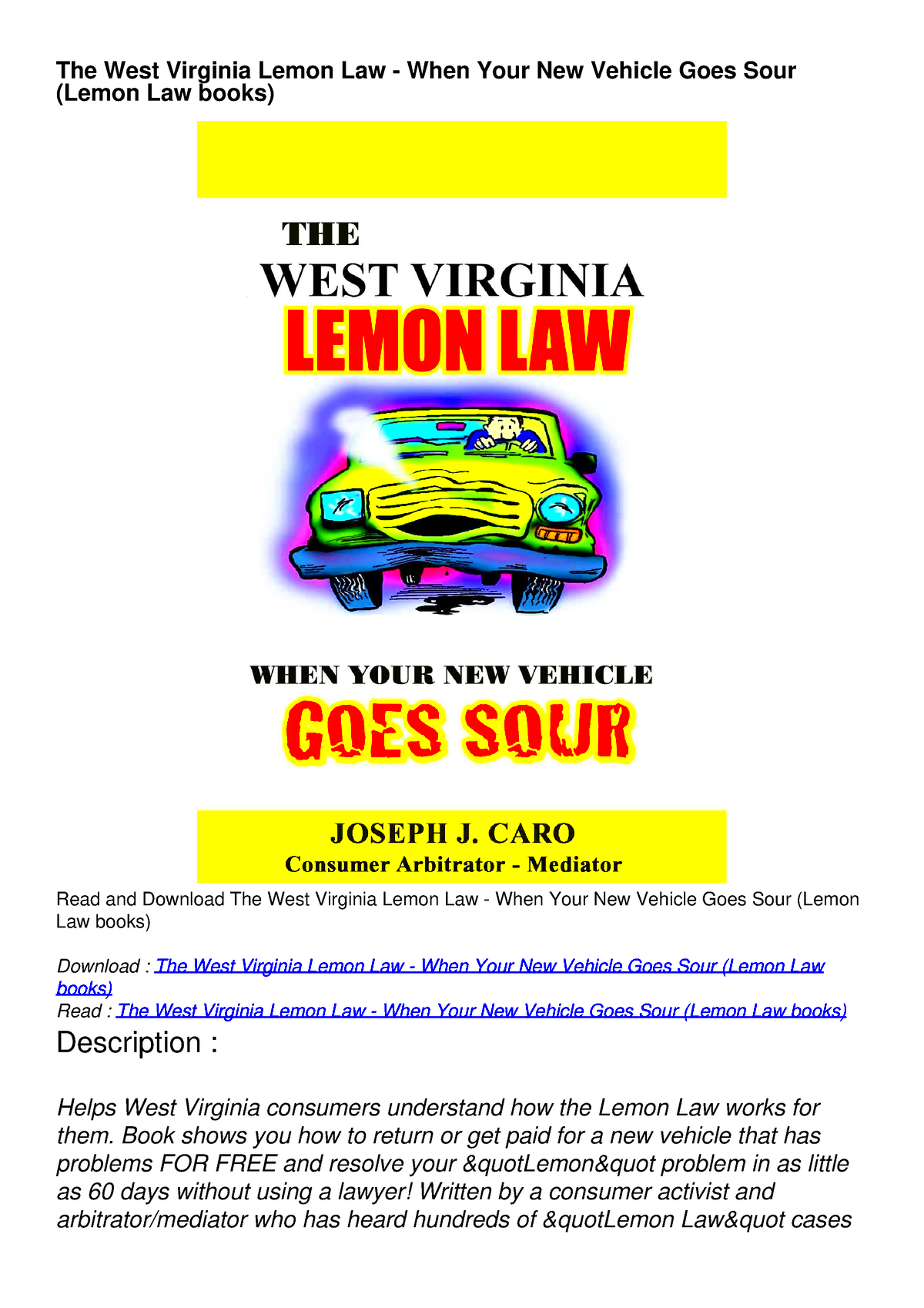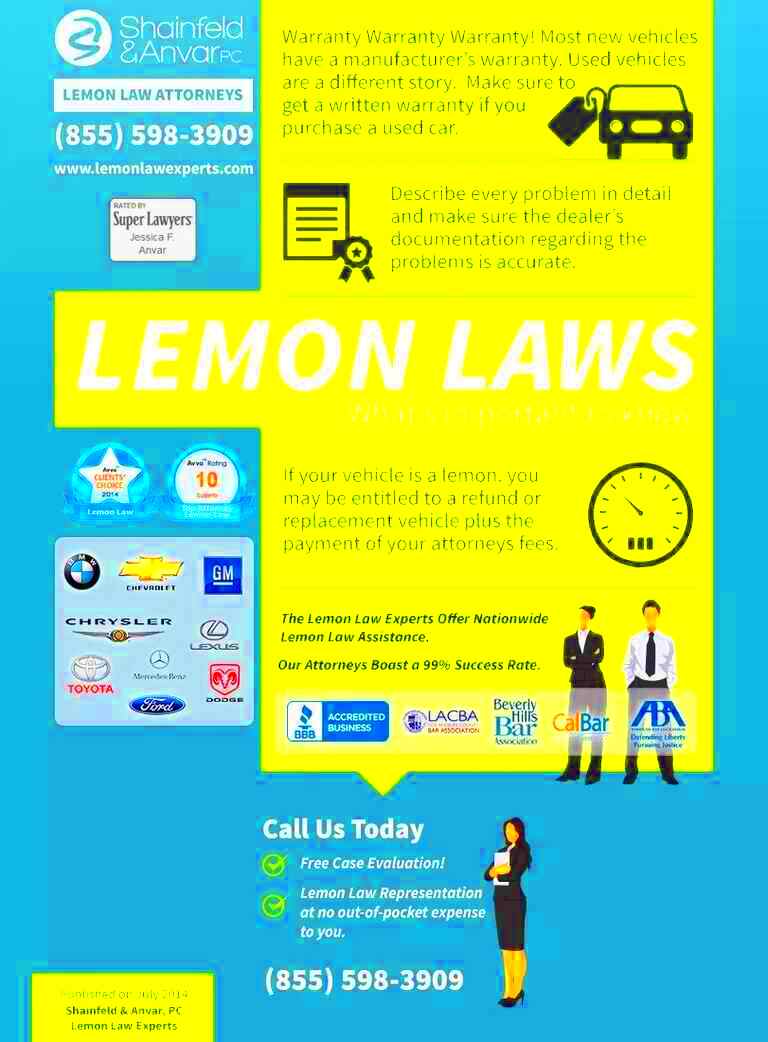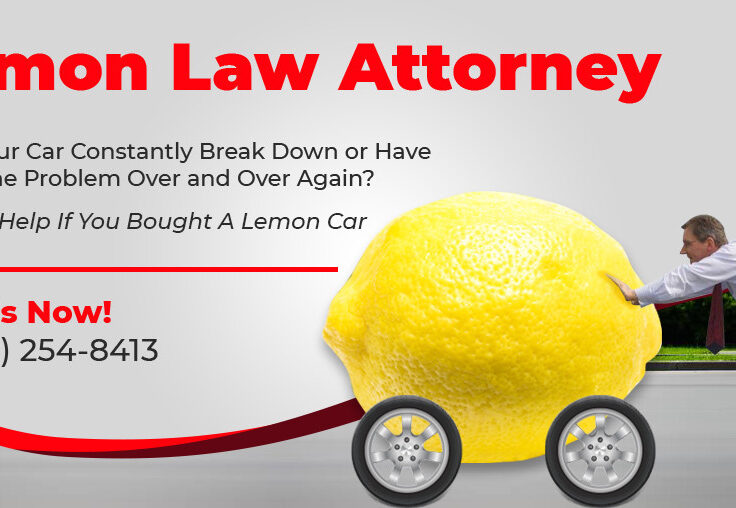West Virginia Lemon Laws and Your Consumer Rights
Have you ever purchased a car that looked flawless in the showroom only to become a constant source of annoyance? In West Virginia lemon laws exist to safeguard consumers from such situations. These regulations provide a solution if your new car turns out to be faulty and doesn’t meet certain criteria. It’s somewhat akin to having a safety net when you find yourself caught off guard by repairs and a car that simply refuses to cooperate.
West Virginias lemon laws apply to various types of vehicles such as cars, trucks and SUVs. These laws protect consumers by stating that if a vehicle has a defect that impacts its usability, value or safety and the manufacturer or dealer fails to fix it after a number of tries you may be eligible for a replacement or a refund.
To make the most of these regulations it’s important to grasp the details like the timeline for taking action and what constitutes a major flaw. The goal is to provide you with peace of mind knowing that you won’t be stuck with a car that keeps falling short. If you’ve ever been burdened by repair costs and annoyance this is where West Virginia’s lemon laws come into play to bring you some comfort.
Eligibility Criteria for Lemon Law Claims

Not everyone who has issues with their car can make a lemon law claim. To qualify for protection under West Virginias lemon laws you must meet certain criteria. Knowing these requirements can determine whether you receive the justice you seek or encounter more frustration.
To be eligible for a warranty claim the defect needs to be substantial. Small problems or ones that don’t impact the vehicles functionality, worth or safety won’t make the cut. Additionally the defect should fall under the warranty coverage and you should have notified the manufacturer or dealer about it within the warranty timeframe.
Take a look at this handy list to see if you qualify.
- Warranty Coverage: The defect must occur within the warranty period.
- Reasonable Repair Attempts: The manufacturer or dealer must have had multiple opportunities to fix the issue (usually three to four attempts).
- Time in the Shop: The vehicle should have been out of service for a cumulative total of 30 days or more.
- Notification: You must notify the manufacturer or dealer about the defect and give them a chance to address it.
If these requirements are fulfilled you probably have a solid case to submit a claim. Keep in mind that lemon laws exist to safeguard your interests and being aware of these factors can assist you in securing the support you rightfully deserve.
Process for Filing a Lemon Law Claim

Submitting a lemon law claim in West Virginia might feel overwhelming at first. However if you break it down into steps you can make the process go more smoothly. Here’s an easy to follow guide to assist you in navigating this procedure with assurance.
1. Keep a Record of Everything: Make sure to maintain thorough documentation of all repairs and interactions with the dealer or manufacturer. This encompasses repair orders, receipts and any communication concerning the issue.
2. Allow the Manufacturer Some Time: Prior to making a claim make sure you’ve provided the manufacturer or dealer with a reasonable chance to address the problem. Typically this involves multiple attempts to resolve the issue or a considerable duration spent at the repair shop.
3. Get in Touch with the Maker: Send a complaint to the manufacturer in a formal manner. Be sure to detail the issue, your efforts to fix it and your desire for a refund or a replacement.
4. Lodge a Grievance with the BBB: Should the manufacturer fail to respond you might want to file a grievance with the Better Business Bureau (BBB) Auto Line Program. Taking this step can occasionally encourage the manufacturer to take action more promptly.
5. Explore Legal Options If nothing seems to work reach out to a lawyer well versed in lemon law matters. They can offer advice and assist you in submitting a formal lawsuit if it comes to that.
Keep in mind that this can take a while, but being organized and determined is crucial. If you stick to these steps you’ll be more equipped to manage your lemon law case and achieve the outcome you deserve.
What Happens If Your Claim Is Approved

Picture this you’ve been struggling with a car that fails to meet expectations and at last your lemon law claim gets approved. It brings about a sense of relief and victory but what happens after that? Knowing what comes next in the process can empower you to navigate this phase of your journey. With clarity and assurance.
Once your claim gets the green light, you usually have two primary choices a new ride or getting your money back. Let me break down what each choice involves for you.
- Replacement Vehicle: The manufacturer will provide you with a new vehicle that matches the one you originally purchased. This new vehicle should be free of the defects that plagued your previous car. Make sure to check the new vehicle thoroughly and ensure it meets your expectations.
- Refund: If you prefer not to receive a replacement, you can opt for a refund. This refund will usually cover the purchase price of the vehicle, minus a reasonable allowance for usage. The refund process may also include reimbursement for any associated costs, such as registration fees and taxes.
Moreover the company may need to take care of your legal expenses which can bring considerable comfort. Nevertheless get ready for some documentation and possible discussions to wrap things up. This is where being well informed about your rights and the procedure can have an impact.
Getting a result from your claim not only solves your problem but also emphasizes the significance of defending your consumer rights. Its akin to closing the book on a chapter and embarking on a new beginning.
Common Issues Covered by Lemon Laws
When it comes to lemon laws not every issue with a vehicle falls under their protection. These laws target problems that are serious enough to impact the safety, worth or functionality of your car. Knowing the types of issues that are commonly included can assist you in assessing whether your vehicle is eligible for a claim.
Here are a few problems that lemon laws typically address.
- Engine Problems: Persistent engine failures or defects that affect the vehicle’s performance and reliability.
- Transmission Issues: Problems with shifting gears or transmission slippage that impact the vehicle’s driveability.
- Brake Failures: Defects in the braking system that compromise the safety of the vehicle.
- Electrical System Failures: Issues with the electrical components, such as lights, power windows, or ignition systems, that cause frequent malfunctions.
- Heating and Cooling System Problems: Failures in the air conditioning or heating systems that make driving uncomfortable or unsafe.
It’s worth mentioning that small problems or superficial flaws typically aren’t covered by lemon laws. To make a claim the issues must be significant and ongoing. If your car breaks down often or has problems that impact its functionality and safety it could be worth looking into your choices regarding lemon laws.
From my personal journey I’ve witnessed the annoyance that comes with enduring issues. Knowing the criteria for lemon laws can equip you to stand up for yourself and pursue the support you rightfully deserve.
Consumer Rights Under Lemon Laws
As a buyer its important to be aware of your rights when it comes to lemon laws, especially if you encounter issues with a vehicle. These laws are in place to protect you from being stuck with a faulty product. Knowing your rights can empower you to assert yourself and navigate the situation more effectively.
Here’s a summary of your rights when it comes to lemon laws.
- Right to a Repair or Replacement: If your vehicle has a significant defect that hasn’t been fixed after a reasonable number of attempts, you have the right to a repair, replacement, or a refund.
- Right to a Refund: If the vehicle is determined to be a lemon, you can choose to get a full refund of the purchase price, minus a reasonable deduction for usage.
- Right to Reimbursement: You may be entitled to reimbursement for additional costs related to the defect, such as towing charges, rental car expenses, and repair costs.
- Right to Legal Representation: If the manufacturer disputes your claim, you have the right to seek legal representation to help resolve the issue.
Being aware of these rights from the start is essential. In my experience being informed about these rights greatly impacted my level of confidence in handling the situation. It feels like having a protective shield that safeguards you from having to face the challenges of a defective vehicle alone.
By knowing and asserting your rights under lemon laws you can approach the process more confidently and reach a fair outcome for your vehicle problems.
Tips for Navigating Lemon Law Disputes
Navigating a lemon law dispute can be overwhelming with all the paperwork and legal terminology involved. I understand how challenging it can be. However if you have a few strategies in hand it can make the process smoother and boost your confidence. Here are some useful suggestions to keep in mind.
- Keep Detailed Records: Document everything from repair attempts to communication with the dealer or manufacturer. This includes keeping copies of repair orders, emails, and letters. This record-keeping is crucial as it provides evidence of your attempts to resolve the issue.
- Understand Your Rights: Familiarize yourself with West Virginia’s lemon laws. Knowing the specifics of what qualifies as a lemon and what your rights are can empower you to make informed decisions.
- Communicate Clearly: When interacting with the manufacturer or dealer, be clear and concise. Provide a detailed description of the issues and your expectations. Avoid vague language, as specific details strengthen your case.
- Seek Legal Advice: If the dispute seems overwhelming, consult with an attorney who specializes in lemon law cases. Their expertise can guide you through the legal process and increase your chances of a successful resolution.
- Stay Persistent: Lemon law disputes can sometimes be drawn-out. Stay persistent and follow up regularly. Your determination can make a difference in how swiftly your issue is resolved.
Based on what Ive seen these suggestions have been incredibly helpful. Dealing with a lemon law issue is usually not so much about chance as it is about being well prepared and staying determined. By taking the approach you can transform a frustrating scenario into a settled case and hit the road again feeling at ease.
Legal Resources and Support in West Virginia
When it comes to handling lemon law matters having the support can truly change everything. In West Virginia there are various resources available to help you navigate through this difficult situation. Whether you’re seeking counsel or simply looking for assistance with the process these resources are ready to lend a hand.
Here are some useful resources to consider:
- West Virginia Attorney General’s Office: They provide information about lemon laws and consumer protection. Their website often includes guidance on how to file complaints and what steps to take.
- Consumer Protection Division: This division helps consumers with disputes and provides resources related to lemon laws. They offer advice on how to handle claims and may offer mediation services.
- Local Bar Associations: Many local bar associations offer referral services to attorneys specializing in lemon law cases. They can connect you with legal professionals who have experience in handling such disputes.
- Legal Aid Services: If you’re facing financial difficulties, legal aid organizations in West Virginia can provide assistance. They offer free or low-cost legal services to eligible individuals.
Being able to tap into these resources can help ease the pressure and uncertainty that comes with lemon law issues. When I went through a similar situation turning to these sources brought me the clarity and assistance I needed. They can be instrumental in guiding you through your rights and navigating the complexities of the legal system.
Frequently Asked Questions about Lemon Laws
When it comes to lemon laws, you might have a few queries, and that’s completely normal! The legal stuff around defective vehicles can get confusing. I remember being unsure when a friend of mine faced a similar issue with her car. To help ease the process for you, here are some frequently asked questions along with their answers.
What is the lemon law?
Lemon laws are in place to protect consumers who end up with faulty vehicles. If a vehicle has a significant defect that affects its use, value, or safety and can’t be fixed after a few repair attempts, the law steps in. It allows you to either get a refund or a replacement vehicle.
How do I know if my vehicle qualifies as a lemon?
Your vehicle might be considered a lemon if it has a defect covered by the warranty that keeps recurring despite multiple repair attempts. Another factor is if your vehicle has been out of service for a total of 30 days or more due to the defect.
What should I do if my claim is denied?
It can be really frustrating to have your claim denied. I know from experience that reviewing the denial letter carefully helps a lot. It usually lists the reasons why your claim didn’t go through. You can appeal the decision, seek legal advice, or even file a complaint with the Better Business Bureau if needed.
How long do I have to file a lemon law claim?
In West Virginia, for instance, there’s typically a time limit, which is usually tied to the warranty period. It’s important to check your vehicle’s warranty and the lemon law guidelines to ensure you’re acting within the required timeframe.
Can I get compensation for additional costs?
Yes, if your claim is successful, you could be compensated for other costs like towing fees, rental cars, or even the repair expenses you’ve had to pay due to the defect.
These answers cover the basics, but every case can be a little different. From personal experience, having clear answers made a huge difference in understanding what steps to take. If you’re still unsure about your situation, consulting an expert might be the best way forward.
Conclusion
Dealing with the intricacies of lemon laws can be quite a task but having a clear understanding of your rights and the process involved can really make a difference. Whether it’s figuring out if your vehicle meets the criteria for a lemon or knowing where to get assistance every step you take brings you closer to a resolution. It’s somewhat similar to untangling a knot; with time and the tools you’ll find a way through. Keep in mind that your consumer rights are in place to safeguard you and taking steps can lead to a positive outcome. Whether you’re seeking a refund, a replacement or just some guidance don’t hesitate to tap into the resources at your disposal. Your determination and knowledge play crucial roles, in transforming a frustrating situation into a successful one.


